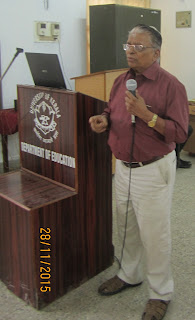[Blog of the
Annual-cum-International Conference 2015]
Notes from the Plenary Session
Dr. KR.Sivadasan
Former
Dean, Faculty of Education
University
of Kerala
Cognitive
neuroscience – myth or reality
*Neuroscience – study of the functioning of
neurons.
-It’s the
learning of the brain.
-Are the
functions of the brain the same in all living beings?
*Brain
and its size
-Is the size of the brain the same in all living
beings?
-Relationship between SES and brain – study
regarding
-Can we change the size of the brain?
*Cognitive
neuroscience
-The term
indicates that both concepts of cognition and neuroscience
are related. In the absence of either of them, man cannot actively
participate in activities where
cognitive skills like logical thinking,
analytical thinking, creative thinking, reasoning etc., are integrated with
neurons in the brain. This process of integrative system helps mould the
abstract ideas into motor activities.
-However,
no consensus for a definition
* For reflection :
-Do the thinking process and
the integrative system presented take
place in all animals?
-
*Development of Neuroscience
-Difficult to study the child’s brain.
-Restrictions
by governments. For instance, Australia.
-Brain
imaging techniques help to get data.
Brain
Plasticity/Neuroplasticity
-The brain can be moulded.
-Imagine it as a lump of porridge. We can change the
shape of porridge by a spoon falling in it.
-Likewise, the neural networks within the brain recognize in response to sensory stimulation
– external and internal.
-The brain has the capacity of rewiring itself via
synaptogenesis.
-Brain plasticity – a synonym for neurogenesis.
Education
and Brain plasticity
-In Education, functional plasticity is important.
-Functional plasticity is the ability to change
behaviour following internal and external experiences
Link between Education & Neuroscience
-Beuchamp and Beuchamp feel the
importance of creating a link between the findings of neuroscience research and the contexts in which teaching
and learning take place.
-But there are issues… try to list
them
Findings
in Neuroscience
-Neuroscience produced findings about the brain and
its functions.
-Those findings can potentially impact the ways
teachers approach their learners.
Research conducted
in Stanford University
*Methods
of imaging improve.
*Neuroscientists
and educators can now identify changes
in children’s brains as they learn. (Stanford Report, November 21, 2014).
*Researchers
in Stanford are trying to “understand how
educational experiences are driving changes in the brain….”!
-They have state-of-the- art neuroimaging
facilities.
-They train the next
generation of leaders in educational neuroscience!

Great Sir! We need to start research here in India. Richard Boyatzis of Case Western Reserve University and his associates are doing intensive research on cognitive neuroscience and management education. I have taken a course Inspiring Leadership offered by Richard E Boyatzis DISTINGUISHED UNIVERSITY PROFESSOR
ReplyDeletePROFESSOR, DEPARTMENTS OF ORGANIZATIONAL
BEHAVIOR, PSYCHOLOGY, AND COGNITIVE SCIENCE
H.R. HORVITZ CHAIR OF FAMILY BUSINESS
CASE WESTERN RESERVE UNIVERSITY which was offered through coursera.org
Very much interesting.